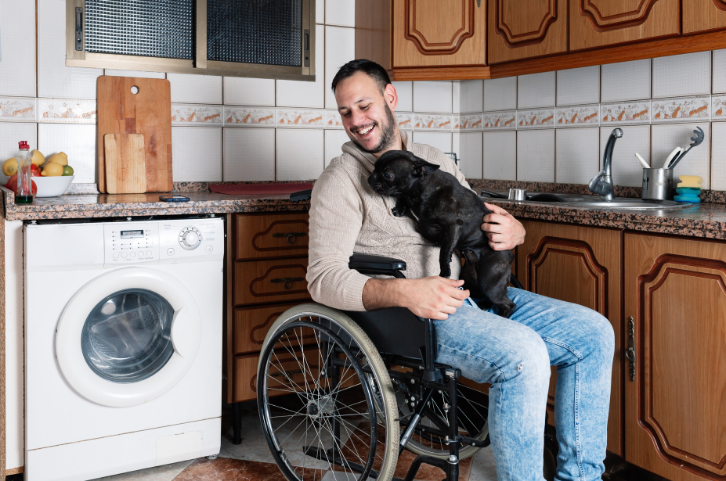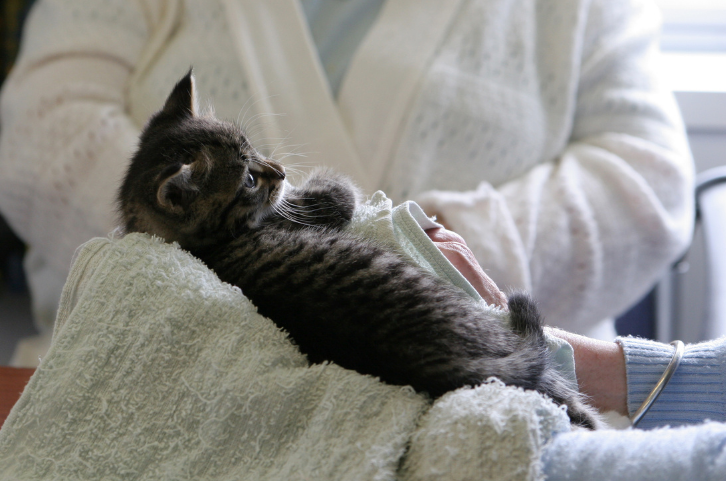When receiving aged, disability or home care, we may feel the need for interaction. Whilst family and friends can come over and see us, it may be an idea to look into bringing a pet home. Whether it’s adopting a pet for good or having someone bring a pet for a visit, pets can provide so much more than entertainment and friendship, as they are even capable of helping with our health in a few different ways. Let’s take a look into the benefits of pets for those in or receiving aged or disability care.

1. Mental Health
When it comes to the elderly or the disabled living alone, we can all agree that there may be a feeling of loneliness or isolation if without care. This can have a severe impact on the individuals’ mental health. Bringing in a pet can tackle the problem of loneliness, whilst also helping to lift a person’s mood, and give them something to take care of.
2. Blood pressure
When living with a pet, it’s normal to feel relaxed and happier. This can be great for seniors with high blood pressure, or even those living with disability who may also have this condition. By playing with or petting their companion pet, they will feel a great reduction in stress, which in turn can assist with lowering their blood pressure. Having persistently high blood pressure can increase a person’s risk of heart disease, heart attacks, strokes and other potentially life-threatening conditions.
3. Increased physical activity
This one typically only applied to dogs, since they need to be walked regularly. The increase in physical activity may provide joy to seniors and those living with disabilities if they are able to get around outdoors. The fresh outdoors will also be a huge mood booster for both the client and the dog being walked. Carers will even be able to join a client and their dog on a walk. Dogs are also great boredom busters for younger people living with disability who have higher energy levels.
4. Social & icebreaking
Going hand in hand with increased physical activity from taking your pet for walks, having a pet with you makes for a great conversation point when you’re out and about. From people on walks who find your dog adorable, to fellow dog owners, having a dog just seems to invite chit chat.

5. Cardiovascular health
Another point that branches from going on walks is that this will improve your heart health. As physical activity increases from going out on walks, it does your body some good too! Some studies suggest that just three 30 minute walks a week is enough to lower your bad cholesterol levels, and raise your good cholesterol levels, something we think is one of the best benefits of pets for those in care. Sometimes we need a little push to put the effort in to doing a walk, however when caring for a pet, it makes the task seem a little less of a chore and more of a fun stroll with your furry friend.
6. Memory stimulation
The use of therapy pets in care homes is a practise that’s been around for a while now, and with good reason. A therapy pet visit usually happens each week and one main benefit is that it may stimulate the client’s memory as they become able to recall the pets name each visit. This is especially good for aged care residents with dementia.
7. Anxiety reduction and sensory therapy
For children and adults with autism, pets have proven to be highly beneficial on several fronts, especially when it comes to reducing anxiety. This includes helping with social interactions, helping develop routines and feeling confident. Moreover, cuddles and patting are calming thus offering sensory benefits.
Conclusion
Now that you know the benefits of pets for those in care, we imagine you are jumping out of your seat to potentially get a pet for yourself or an elderly or disabled client. However, it’s definitely worth looking at what pet would best suit.
If you are interested in getting a pet for someone elderly, check out our blog post on the Top 5 Pets for Seniors to get a run down on what we believe to be the best pets for seniors.
Carers should also note that they will probably have to help with the pet care as part of their home care services.








